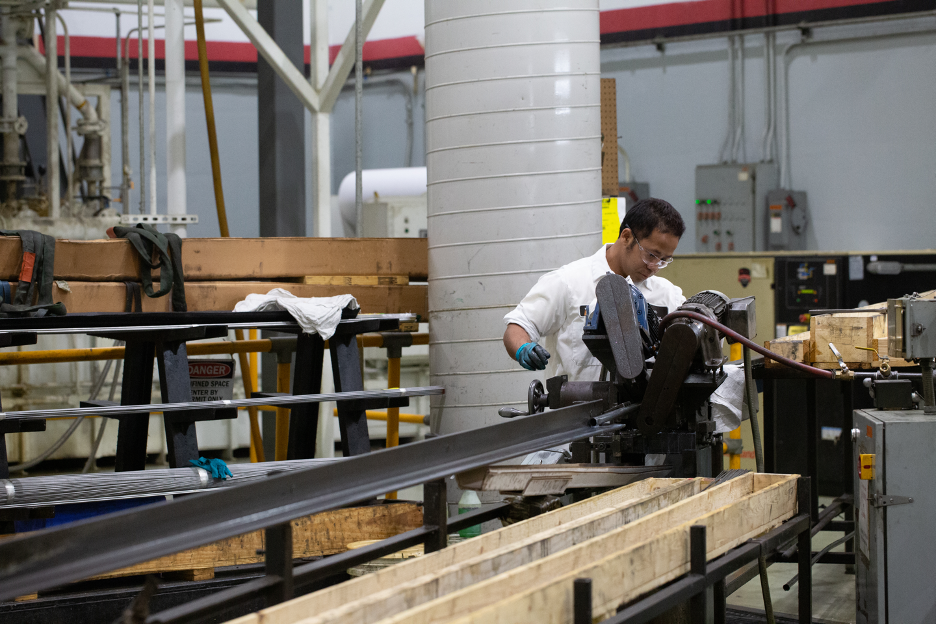When it comes to selecting the right material for your project, the choice between stainless steel and carbon steel can be quite perplexing. Both materials have their own unique properties and characteristics that make them suitable for various applications.
Do you need help deciding on the right option for your project? If so, you’ve come to the right place. Below, this precision ground bar supplier in Houston, Texas is going to discuss some of the key things you should know about stainless steel and carbon steel, uncovering their distinct features to help you make an informed decision.
The Properties and Characteristics of Stainless Steel
Stainless steel is renowned for its exceptional corrosion resistance, making it an ideal choice for applications where durability is paramount. This alloy is composed of iron, chromium, and other elements such as nickel and molybdenum, which contribute to its corrosion resistance. Furthermore, stainless steel exhibits excellent strength and high temperature resistance, making it suitable for a wide range of industries, including construction, automotive, aerospace, and more.
When produced by a reputable precision ground bar supplier in Houston, Texas, stainless steel also boasts a visually appealing appearance. Its lustrous surface can be easily maintained, making it a popular choice for architectural structures and decorative purposes. Moreover, stainless steel is hygienic and easy to clean, which is why it is widely used in the food and beverage industry.
The Properties and Characteristics of Carbon Steel
While stainless steel takes the spotlight for its corrosion resistance, carbon steel shines in terms of its strength and versatility. Carbon steel is primarily composed of iron and carbon, with other elements present in smaller quantities. Its high carbon content gives it exceptional strength, making it suitable for heavy-duty applications such as structural beams, machinery components, and tools.
One of the key advantages of carbon steel is its affordability. Compared to stainless steel, carbon steel is generally more cost-effective, making it a popular choice for projects with budget constraints. Additionally, carbon steel is highly machinable and weldable, allowing for ease of fabrication and customization.
It’s important to note, however, that carbon steel is more susceptible to corrosion compared to stainless steel. Without proper coating or protection, carbon steel can rust when exposed to moisture or harsh environments. With that said, careful consideration should be given to the application and environment before choosing carbon steel.
Applications and Uses of Stainless Steel
The unique properties of stainless steel make it a versatile material that finds its application in a wide range of industries. In the construction sector, stainless steel is used for structural components, roofing, and cladding due to its durability and resistance to corrosion. The automotive industry relies on stainless steel for exhaust systems, body panels, and trim due to its high-temperature resistance and attractive appearance.
In the realm of healthcare, stainless steel is widely used for medical equipment, surgical instruments, and implants due to its biocompatibility and ease of sterilization. The food and beverage industry also heavily relies on stainless steel for processing equipment, storage tanks, and utensils due to its corrosion resistance and hygienic properties.
Applications and Uses of Carbon Steel
Carbon steel, with its exceptional strength and affordability, finds its applications in a variety of industries. In the construction sector, carbon steel is used for structural beams, columns, and reinforcement bars due to its high strength and load-bearing capacity. The manufacturing industry utilizes carbon steel for machinery components, gears, and tools due to its machinability and durability.
In the oil and gas industry, carbon steel is utilized for pipelines, storage tanks, and drilling equipment due to its strength and resistance to high-pressure conditions. Additionally, carbon steel is commonly used in the production of railways, bridges, and shipbuilding due to its exceptional toughness and ability to withstand heavy loads.
Choosing the Right Steel for Your Project
Now that we have explored the properties, characteristics, and applications of both stainless steel and carbon steel, it’s time to make the right choice for your project. First and foremost, you should consider the specific requirements of your application — including the desired level of corrosion resistance, strength, cost, and aesthetics.
If corrosion resistance and visual appeal are crucial factors, stainless steel may be the better choice. On the other hand, if strength and affordability are paramount, carbon steel may be the more suitable option. It is also worth noting that a combination of both materials can be used in certain applications to leverage their respective advantages. If you need help finding the right option for your project, you can always get in touch with your local precision ground bar supplier in Houston, Texas for assistance.
Looking for a Precision Ground Bar Supplier in Houston, Texas?
When it comes to selecting the right steel for your project, the choice between stainless steel and carbon steel can be challenging. Understanding the properties, characteristics, and applications of these materials is essential in making an informed decision.
Are you ready to order carbon steel or stainless steel materials for your upcoming project? If so, and if you’re looking for the best precision ground bar supplier in Houston, Texas, Banner Industries is the company to call. Contact us today at (800) 950-3652 to find the right steel solution for your project.







